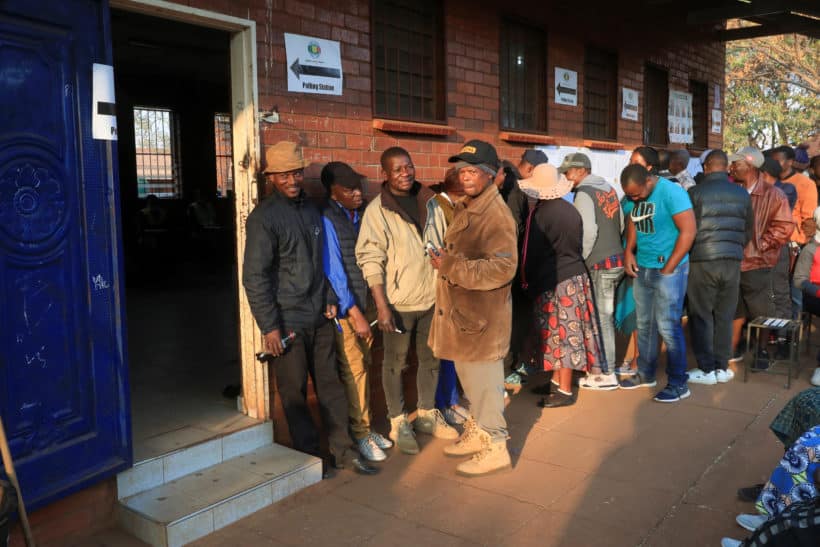
HARARE, Aug 23 (Reuters) – Zimbabweans voted on Wednesday with many citizens desperate for change after two decades of relentless economic chaos but sceptical that the ruling ZANU-PF party will allow a credible election or any loosening of its stranglehold on power.
President Emmerson Mnangagwa is seeking re-election after a first term during which runaway inflation, currency shortages and sky-high unemployment made life a misery for Zimbabweans, many of whom rely on U.S. dollar remittances from relatives abroad to make ends meet.
The cash-strapped country’s chances of resolving a debt crisis that prevents it from accessing World Bank and International Monetary Fund loans are at stake, as foreign lenders have said a free and fair election is a pre-condition for any meaningful talks on the issue.
Mnangagwa, who took over when longtime strongman Robert Mugabe was toppled in a 2017 military coup, faces 10 other candidates including his main challenger, lawyer and pastor Nelson Chamisa of the Citizens Coalition for Change (CCC).
It is the second contest between the two after Mnangagwa won a closely contested poll in 2018, which the opposition alleged was rigged. The country’s constitutional court upheld Mnangagwa’s election.
Polls opened at 7 a.m. (0500 GMT) and were due to close at 7 p.m. (1700 GMT). Some 6.6 million people are registered to vote in the nation of about 15 million.
At Sherwood Primary School in the city of Kwekwe, where Mnangagwa is registered to vote and will cast his ballot later, dozens of voters lined up from 6 a.m. and chatted in hushed tones waiting for voting to start.
Communal farmer Beatrice Sibanda, 65, said: “I want a better life for my children. They need jobs. I hope that after voting life will become better.”
In the capital Harare, in the Kuwadzana constituency where Chamisa will vote, people also said they were hungry for change.
“We are struggling and hungry. I have five grand-children that I am taking care of. I’m fortunate that I own a house and can shelter them as their fathers don’t work,” said Mabel Fambi, a 67-year-old grandmother.
Vote-counting will start as soon as polling stations close, and parliamentary results are expected to trickle in over the course of Thursday morning. The presidential result is expected to come later, though well ahead of a five-day deadline.
LITTLE CHANGE SINCE MUGABE ERA
Political analysts say Zimbabwe’s unending economic maelstrom could tip the contest in favour of the opposition if the election is clean.
The local currency has weakened by about 85% since the start of the year and inflation has reached triple digit levels, pushing people further into poverty in a country where only 30% hold formal jobs.
But analysts say ZANU-PF, which has been in power for more than four decades, has an unfair advantage as it wields control over the police and other key institutions.
“The electoral playing field is heavily skewed in favour of the ruling party, which has used state institutions to close the democratic space,” said Africa Risk Consulting, a private firm, in a pre-election note.
“Five years into Mnangagwa’s rule, conditions have not changed much from the Mugabe era,” it said.
ZANU-PF and the police deny seeking to influence the outcome.
“I have told the Zimbabwe Electoral Commission that what happened in 2018 cannot be repeated. We will not accept a rigged vote,” Chamisa said at his last campaign rally on Monday.
Mnangagwa has repeatedly called for peace and tolerance in his campaign speeches.
“We will deal with those who want to perpetrate violence,” he told supporters on Saturday in Shurugwi, more than 300 km (190 miles) south of Harare.
To win the presidency, a candidate must get more than 50% of the vote. If there is no outright winner, a run-off between the top two candidates will be held on Oct. 2.
Parliamentary and local council candidates only need a simple majority of votes cast.
(Editing by Olivia Kumwenda-Mtambo, Estelle Shirbon and Giles Elgood)

